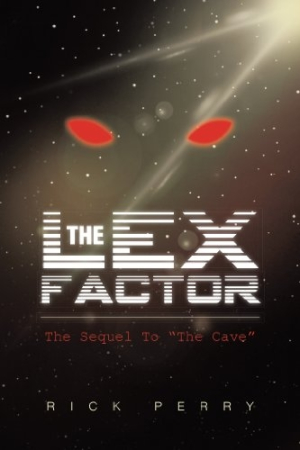The Lex Factor
The Sequel to "The Cave"
The author’s enthusiasm is evident in creating an Earth at peace with itself, but uniting against aliens.
In a world in the distant future, an android that is equal parts human and robot runs amok, and it’s up to one man and his team to stop him. The Lex Factor, by Rick Perry, sets up a world where war has been deemed illegal and peace is mandatory of all citizens of Earth, who have put aside their differences in the interest of fighting a greater enemy—evil aliens.
The main conflict revolves around a rogue android named Lex, and the group of people entrusted with stopping him, lead by the main character, Jarod Anderson, whose wife was put in a coma by Lex. There is a law that “every living human was ‘obligated’ to help another human, should they find themselves in some kind of distress,” although how this law is enforced in a time of war is never explained.
Before readers can be expected to get invested in the war and the plot, the characters need better development. The key is show, don’t tell. Rather than stating Jarod was furious, the context should let the audience pick up on that.
Jarod and his team seem undeveloped and not rounded enough to carry the focus of the novel. The members of his team are stereotypes rather than fleshed-out people (the comic alien, strongman, the woman.) Another villain, General Greyshaw, lacks subtlety, his villainy should be shown throughout the novel, rather than stated outright. It is the same with Lex, who lacks the complexity to carry a novel as the main villain. He’s described as having “sick, insane laughter,” and sounding “very angry, even scary.” Again, it might be better to show how “evil” the villain is and how “good” the protagonist is rather than telling readers how to feel about them.
Descriptions include several phrases that are confusing or otherwise used incorrectly (“it smiled inwardly to itself,” menace you could “cut through…with a knife”). There’s also unnecessary punctuation and capitalization, particularly when characters are conveying an emotion, including repeated use of multiple exclamation points.
Several basic spelling mistakes are distracting: “tabu” for taboo, and “bee line.” The book could also benefit from an entire reformatting. Chapters are broken up unnecessarily; instead of just “Chapter 5” and “Chapter 6,” there’s a Chapter 6A, 6B, 6C, and so on.
The novel does not summarize the first book in the series, The Cave. While several characters from the previous book are included, this novel only mentions events from The Cave a few times. This book can be read as a standalone, though reading the prequel would lend to more of an understanding of the events and characters in this book.
The Lex Factor takes on a massive plot, and because of that, it needs development to make it work. World-building exercises and an editor could help this book tremendously. The enthusiasm is there, but the execution falls short.
Reviewed by
Sonya Lovy
Disclosure: This article is not an endorsement, but a review. The publisher of this book provided free copies of the book and paid a small fee to have their book reviewed by a professional reviewer. Foreword Reviews and Clarion Reviews make no guarantee that the publisher will receive a positive review. Foreword Magazine, Inc. is disclosing this in accordance with the Federal Trade Commission’s 16 CFR, Part 255.

